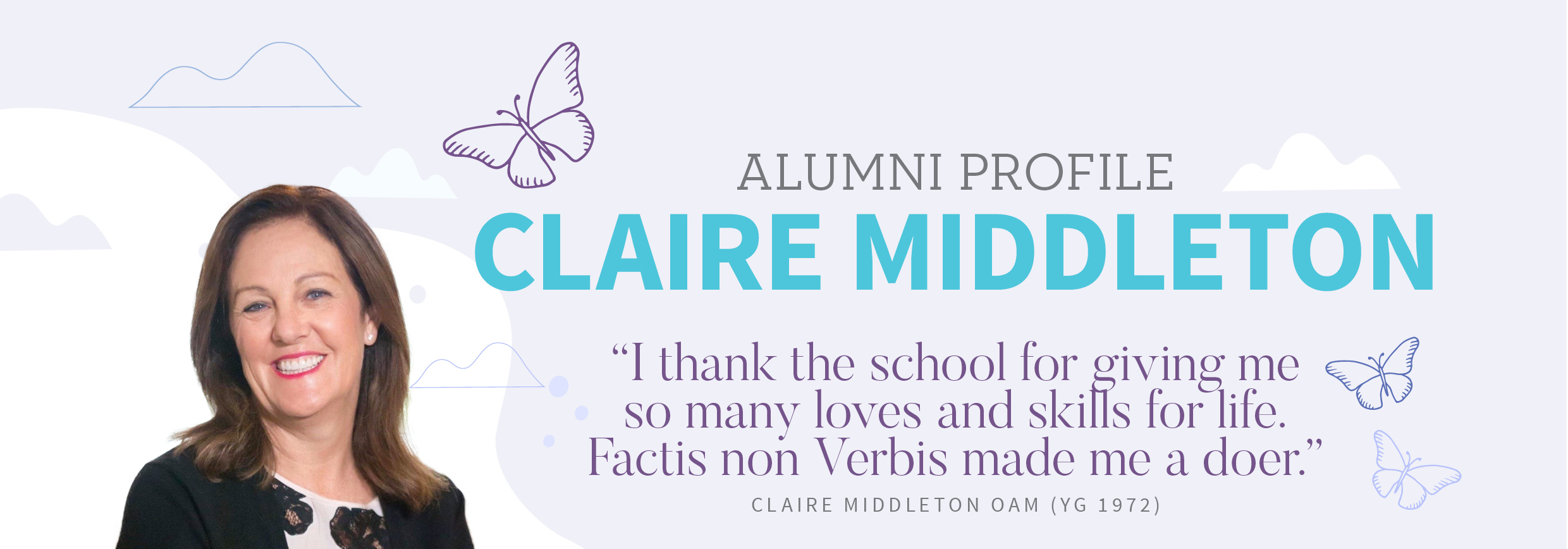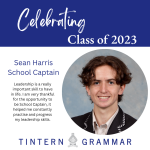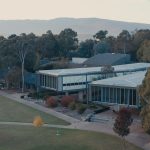
Claire Middleton OAM (YG 1972)
In this year’s Factis magazine, our Alumni section features an interview with the founder of the Butterfly Foundation Claire Middleton OAM (YG 1972). The full interview is shared below.
When and why did you start the Butterfly Foundation and what can you tell us about it?
I started the Butterfly Foundation in 2002. I had two daughters with anorexia and we struggled for three years searching for treatment. We eventually found an amazing clinic, that no longer exists but most people had to mortgage their house to afford the program. For me it became a social justice issue – why should money stand in the way of access to life saving treatment. I had two goals – one to fund people to access treatment and two to breakdown the stigma around eating disorders.
The first goal wasn’t feasible as we couldn’t raise enough money to meet the need. This led me to change the culture and the practice of treatment and prevention for eating disorders nationally. We managed to convince Monash Medical Centre to change the way they were treating Eating Disorders completely and to this day the Butterfly Southern Health Day program flourishes in Chadstone.
The second goal was to break down the stigma. I found Corporates who were prepared to stand up and say NO to the dominant culture of having to be thin to be valued in society. That led to us running body image programs in all schools in Australia.
Do you still work in this field and what do you do now?
Yes. Butterfly grew and grew and became a very large corporate Butterfly. I never imagined that something I started in my kitchen would grow to be so enormous. I decided the political and corporate role was not for me, so I resigned as the Director. Culture is not static it is dynamic and it was time for a new wind to fly the Butterfly.
I always loved helping the sufferers and carers, so I decided to train as an eating disorder coach with a woman in the USA who ran the most amazing clinics, Monte Nido. I am now an Eating Disorder coach where I put treatment programs together for people.
Can you tell us how you help people with eating disorders?
I work with people who have all kinds of ED’s. Binge eating, bulimia nervosa and anorexia nervosa. I am available 24 hours a day 7 days a week for sufferers or carers to get the support they need. I am not a psychologist or a psychiatrist, I work as their coach, not on ‘why’ you got your ED but the “how” we are going to help you get out of it. I help people change their ED behaviours and teach them how to nurture themselves, find their authentic self and challenge the mentality of the ED that dominates them. Over the years, I have made lots of contacts and come to understand both the public and private systems and by sharing this information to sufferers and carers expedite their road to recovery.
How closely are eating disorders connected to mental health and wellbeing?
Eating disorders are both a mental and now a medical health issue since research has discovered anorexia is lined to several genes. This breakthrough has stopped people blaming parents and allows sufferers to look differently at their mental illness. People who suffer from eating disorders mostly also suffer from depression and anxiety and many also suffer from Obsessive Compulsive Disorder. We are losing 2000 people a year to ED’s in Australia – mostly from suicide.
Has society views progressed since you started the Butterfly Foundation?
I would like to think that things have improved. At least the public health system now has continuums of care and the PHN’s (primary health networks) Australia wide are aware that eating disorder treatment has to be core business. This is a change. I am sure that people are way more likely to share their stories, declare their suffering from ED’s and feel less stigma.
Can you share the symptoms friends and family need to look for in those who may be suffering from an eating disorder or a mental health condition relating to food?
It is difficult when kids are in pre puberty phase or pubescent because many of the signs and symptoms may be developmental. However, there are some glaringly apparent things that people should be aware of; general unhappiness, skipping meals and withdrawing from social engagements. With bulimia you might see regular visits to the lavatory especially after eating. Anorexia sufferers may display a reticence to eat with the family or with friends. Some start by cutting out certain foods on the basis of philosophical ideas – vegetarian, vegan, and then whole food groups get excluded. Others may become obsessed with healthy foods; only eat organic for example and some become obsessed with exercise. There are so many variants to how someone with an eating disorder can express their angst. However all ED’s are about emotional disturbance – they are a cry for help.
What advice would you give sufferers or their family/friends?
My advice would be to try and keep your loved one safe. Most sufferers begin in denial so if they are displaying signs of an eating disorder try and get them professional help immediately. The first step is the GP but make sure the GP is educated in ED’s if not ring Butterfly and Eating Disorders Victoria and find out who they should go to. Treating eating disorders is a specialised field and requires specialised treatment. If a sufferer is under 25 you can also call the Royal Children’s Hospital to get advice. The best advice I can give is that you need to hit ED’s fast and hard. The longer an ED goes on the harder it is to gain recovery.
The following questions relate to your time at school:
What is your favourite memory of School?
Most definitely it is the farm. In particular, the pig called Portia and her piglets. Also the pine forest – where we played for hours in a magical world.
What skills did you learn at school which you draw on in your life now?
This is a fabulous question because I thank the school for giving me so many loves and skills for life. For a start, Factis non Verbis made me a doer. It gave me the sense that I had to do good in the world and make a difference. I regret that I wasn’t encouraged to be more academic. However, having said that Tintern grew some amazing people – people who now are leaders socially and environmentally. I used to criticise the school for wasting my education on cooking, sewing, craft, Ag science, music, dance etc. I now thank the school for giving me all of that because I have used it all. I still play the piano daily, I still sew, I am highly creative and am a good cook! And, it hasn’t stopped me getting where I needed to go in terms of doing Butterfly, being recognised with an OAM, Honour Role of Women etc.
The following questions are of a general nature:
What advice would you give your 16-year-old self?
Hold your head up, get to know who you really are, who is your authentic self? Don’t let other people’s behaviour ever stop you from holding your own values and following your heart. Be proud you are enough. So what if you are over your most healthy weight, so what that you don’t look like the skinny models in magazines, – I would say – wow, you have done all of that little girl in your long life and you did it all not as a ‘thin’ person. I would say hold your head high and work on self-compassion – when you love yourself you can reach out to others with that same love; but self-compassion must come first.
What is your best achievement?
Getting over my mental illness: bulimia, anorexia, depression and anxiety enabled me to stand tall. I have produced the most amazing three children and I have twelve grandchildren all who make me smile every day. And then there is my work with ED’s – pretty proud of that particularly when I hear that people’s lives are saved.
What do you see yourself doing in 10 years’ time?
I hope that I will still be an ED coach as I am passionate about it and that I am still a vital advocate for mental health. Sometimes I wonder if there will ever be a time to stop, play golf, play bridge, read and travel but then I think NO – my job isn’t done and till I take my last breath I want to be making this world a better place for others.
Would you like to share anything further about your life or your quest for better care for mental health eating disorder sufferers?
Yes, I want to say to everyone don’t give up on fighting for better healthcare for better mental health. We are making progress but it’s slow. People are listening, corporates are becoming aware, government is aware but we need you – every one of you to stand up and fight for people who have mental ill health. We need parity with medical health. If you come across someone in the street who has tripped and broken their ankle I am sure you will stop and rush to their aid. Why then is it that when we come across a homeless person with mental health slumped on the pavement that we think it’s OK to just walk on by.
Eating disorders are a huge part of mental health – they rip through families, they destroy people’s lives, relationships are destroyed and lives are wasted. Support all organisations that are trying to make a difference and one day like the support for breast cancer it will make a profound impact.
One last thing – I have a photo of me as a little 5-year-old starting school at Tintern. I look at her and I wonder how such a dear little girl could have ended up so sick with mental ill health. And, I can’t believe that despite it all she grew up and survived it. The best message I can leave you is that people CAN recover from ED’s and there is always HOPE. Thanks for the opportunity to raise awareness of ED’s.
View the 2019 Factis Magazine.









